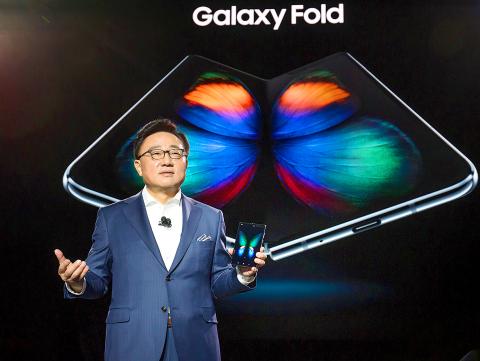Foldable phones are creating a buzz in the consumer electronics sector, and in China’s equity market.
Display maker Tianma Microelectronics Co (天馬微電子) rallied 77 percent this year through Wednesday, in the lead-up to Samsung Electronics Co unveiling a US$1,980 smartphone with a foldable screen.
Fellow display producer BOE Technology Group Co (京東方科技) has jumped 46 percent since the beginning of year.

Photo: EPA-EFE/Samsung Electronics Co
Turnover in both stocks soared as investors bet on hefty demand for screens, especially if Chinese smartphone makers such as Huawei Technologies Co (華為) follow Samsung into foldable models. More than US$612 million worth of Tianma shares traded on Wednesday, about 18 times the daily average turnover for last year, while more than US$1 billion of BOE shares traded every day in the past week in Shenzhen, far outdoing Tencent Holdings Ltd (騰訊), Asia’s biggest stock by market value.
“The surge in flexible panel makers was partly due to valuation recovery, coupled with support from easing liquidity,” Bright Smart Securities (耀才證券) analyst Mark Huang said.
“Samsung’s release of its foldable phone may kick off a new round of upcycle” he said.
Investors went beyond panel makers in the hunt for potential beneficiaries of a foldable phone frenzy. Puyang Huicheng Electronic Material Co (濮陽惠成電子材料), which provides materials used in panels, has jumped 60 percent this year and Shantou Wanshun Package Material Co (汕頭萬順包裝材料) is up 32 percent.
China International Capital Corp (中金公司) counts both among its top picks for investors to capture the theme.
Although, for CGS-CIMB Securities Hong Kong Ltd (銀河-聯昌證券) analyst Ray Kwok (郭錦威) the trade has even further to run as valuations are below their historic averages.
“Investors who join the trade now may start to feel a little bit of pressure as stocks have gained in the past few weeks, though sector valuation catch-up will continue, adding fuel to the speculation,” he said.
Tianma trades at about 18 times 12-month forward earnings, still 23 percent below its five-year average. BOE Technology is approaching its five-year average of 24. Kwok’s price targets suggest 33 percent more upside for Tianma and 11 percent for BOE from yesterday’s close.
Not everyone is that optimistic.
The stocks might soon face a reality check as gains so far have been driven by speculation rather than fundamentals, Huatai PineBridge Fund Management Co (華泰柏瑞) fund manager He Qi said.
“Flexible is still just an idea,” He said of the phones. “It’s not guaranteed that panel makers will be able to make a profit out of it — it normally takes two to three years before a new tech proves profitable.”
Suppliers elsewhere have also been boosted by Samsung’s new phone. Equipment-maker Finetek Co jumped as much as 24 percent yesterday morning in Seoul, before paring to a 3.7 percent gain. The two-day rally was the biggest since August 2016.
However, Samsung’s shares fell as much as 1.5 percent before adding 0.1 percent at the close.

The Eurovision Song Contest has seen a surge in punter interest at the bookmakers, becoming a major betting event, experts said ahead of last night’s giant glamfest in Basel. “Eurovision has quietly become one of the biggest betting events of the year,” said Tomi Huttunen, senior manager of the Online Computer Finland (OCS) betting and casino platform. Betting sites have long been used to gauge which way voters might be leaning ahead of the world’s biggest televised live music event. However, bookmakers highlight a huge increase in engagement in recent years — and this year in particular. “We’ve already passed 2023’s total activity and

Nvidia Corp CEO Jensen Huang (黃仁勳) today announced that his company has selected "Beitou Shilin" in Taipei for its new Taiwan office, called Nvidia Constellation, putting an end to months of speculation. Industry sources have said that the tech giant has been eyeing the Beitou Shilin Science Park as the site of its new overseas headquarters, and speculated that the new headquarters would be built on two plots of land designated as "T17" and "T18," which span 3.89 hectares in the park. "I think it's time for us to reveal one of the largest products we've ever built," Huang said near the

China yesterday announced anti-dumping duties as high as 74.9 percent on imports of polyoxymethylene (POM) copolymers, a type of engineering plastic, from Taiwan, the US, the EU and Japan. The Chinese Ministry of Commerce’s findings conclude a probe launched in May last year, shortly after the US sharply increased tariffs on Chinese electric vehicles, computer chips and other imports. POM copolymers can partially replace metals such as copper and zinc, and have various applications, including in auto parts, electronics and medical equipment, the Chinese ministry has said. In January, it said initial investigations had determined that dumping was taking place, and implemented preliminary

Intel Corp yesterday reinforced its determination to strengthen its partnerships with Taiwan’s ecosystem partners including original-electronic-manufacturing (OEM) companies such as Hon Hai Precision Industry Co (鴻海精密) and chipmaker United Microelectronics Corp (UMC, 聯電). “Tonight marks a new beginning. We renew our new partnership with Taiwan ecosystem,” Intel new chief executive officer Tan Lip-bu (陳立武) said at a dinner with representatives from the company’s local partners, celebrating the 40th anniversary of the US chip giant’s presence in Taiwan. Tan took the reins at Intel six weeks ago aiming to reform the chipmaker and revive its past glory. This is the first time Tan